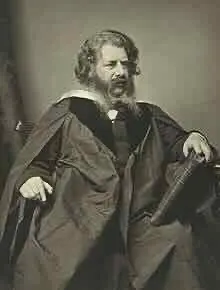On December 24, 1449 in Celtic History
William john macquorn rankine, scottish physicist and engineer, died

William John Macquorn Rankine FRSE FRS (5 July 1820 – 24 December 1872) was a Scottish mathematician and physicist. He was a founding contributor, with Rudolf Clausius and William Thomson (Lord Kelvin), to the science of thermodynamics, particularly focusing on its First Law. He developed the Rankine scale, a Fahrenheit-based equivalent to the Celsius-based Kelvin scale of temperature.
Thermodynamics
Rankine is perhaps best known for his contributions to the field of thermodynamics. He developed the Rankine cycle, a process used to convert heat into mechanical energy, which is still fundamental in thermal power stations.
Engineering and Material Science
Rankine made significant contributions to civil engineering and material science. He developed theories on the behavior of structures and materials under stress, which were crucial in the design and construction of bridges, railways, and other engineering projects.
Rankine Scale
He proposed the Rankine temperature scale, an absolute temperature scale similar to the Kelvin scale but measured in degrees Fahrenheit. This scale is still used in certain engineering fields, particularly in the United States.
Academic Career
Rankine held a professorship at the University of Glasgow, where he taught engineering. His role as an educator was influential, and he was revered for his ability to convey complex scientific concepts.
Publications
Rankine was a prolific writer, authoring several textbooks and scientific papers. His works covered a range of topics, from machine design to the physics of gases.
Professional Societies
He was actively involved in various professional societies, contributing to the development of standards and practices in engineering and science.
Legacy
Rankine’s legacy in science and engineering is significant. His theories and discoveries have had a lasting impact, particularly in the fields of thermodynamics and mechanical engineering. The term “Rankine” continues to be used in various scientific and engineering contexts, testament to his influence.
William John Macquorn Rankine’s work exemplifies the interdisciplinary nature of 19th-century scientific inquiry, where the boundaries between physics, engineering, and mathematics were often blurred. His contributions have had enduring value and continue to be relevant in modern engineering and thermodynamics.
Related Content

Shane Patrick Lysaght MacGowan, lead singer of the Pogues, died

St Machar Day, patron saint of Aberdeen

Oíche Shamhna - Cetlic New Year Eve (Halloween)

ALBAN ELFED (Welsh Bardic name for autumn equinox)

Feast day of St. James

John Davie Burgess, King of the Highland Pipers, died at age 71.